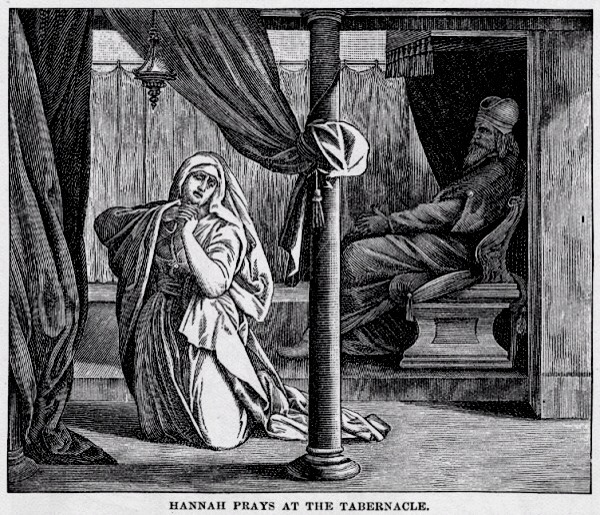Occasionally, I seem to think that I’ve got stuff pretty much worked out. I go through my life thinking that if I just make everybody at work happy, keep my family satisfied, advance myself somehow either in my career or educationally, if I just work hard enough or think long enough or talk with enough people that somehow I’m okay. Simon and Garfunkel had the lyric, “I am a rock. I am an island.” I think that’s the way that most of us go through our lives: thinking that somehow self-sufficiency is truly the measure of a good person.
I started a sermon series recently with my youth group. And after much consideration I thought that I Samuel would be a good book to go through with these teens. I was really thinking of the life of Samuel as illustrated in the book as the basis of the bulk of my teachings for them. But studying the first chapter really became an event in itself.
The story of Hannah probably doesn’t get enough attention in the church today. (It’s probably the Old Testament in general that doesn’t get enough attention, but I digress.) Hannah was a woman married to, for all intents and purposes, a really good dude. Hannah’s husband loved her very much. He seemed to honor her as was fitting. He did have another wife and kids, but I won’t get into the morality of Old Testament polygamy here. The big issue is that Hannah couldn’t have kids. It seems like Hannah’s husband was fine with that, but Hannah really, really wanted kids. In addition to the pain she felt from that, she also had to put up with the incessant bullying of her husband’s other wife.
One time when the family went to the temple to offer a peace offering, she had had enough. She went to the temple to pray and apparently was in such emotional distress as she was praying that the priest, Eli, thought she was drunk. Eli, who had a responsibility to oversee Temple worship, went over to Hannah to chastise her for basically coming to worship drunk. Hannah corrected him and told him how much anguish, how much hurt, how much pain she was in over the fact that she didn’t have a son. She told him how she was crying out to God from her desperation. Eli, who probably had seen enough of his share of less-than-genuine worship, was obviously moved by this sincerity, genuine emotion, the real pain in worship that he saw in Hannah. He gave her a Priestly Blessing and moved on.
If you continue to read on in I Samuel chapter one after that story, you’ll hear how Hannah’s prayer was answered. And then you’ll get into the life of Samuel, but that’s not the point of this post.
The point, I think, is that we all have real hurt. Hanna’s husband couldn’t take it away. Even Eli, with all his training and authority, couldn’t take it away. The only place she could go with her hurt was to the throne room of God. And beyond that, it was the most sincere form of worship that could be offered.
When Israel’s kings used to ride into town after a battle on their horse, the crowds would yell out, “Hosanna!” Roughly translated, that comes into English as “rescue” or “help.” The reason that word was a form of praise was because it signified that the king alone could actually do something about the need. Thusly, the crowds yelled out to Jesus the same thing when he rode into Jerusalem on a donkey.
God is not in the business of sustaining do-it-yourselfers. He is in the business of helping the desperate. He is in the business of rescuing, of saving, of healing. When we hold on to the idea that we can do it ourselves, we’ve negated the terrible price that was paid for our salvation. When we come to God, we can’t come on our own. We come wholly and completely by the blood of Jesus. True worship is desperate worship as Hannah demonstrated for us. May we all be a little bit more desperate and humble like Hannah was.





2 Comments
Leave your reply.